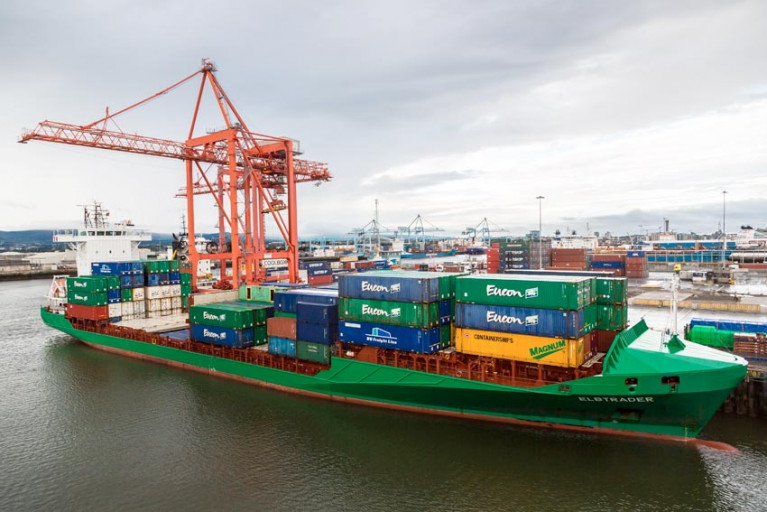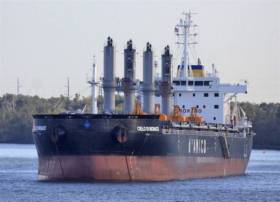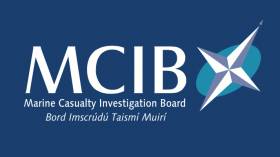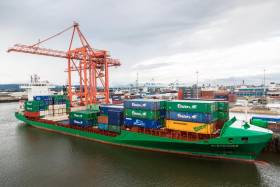Displaying items by tag: Marine Survey Office
European Union (Safe Loading and Unloading of Bulk Carriers) (Amendment) Regulations 2024
The European Communities (Safe Loading and Unloading of Bulk Carriers) (Amendment) Regulations 2024 (SI No 110 of 2024) entered into force on 27 March 2024.
Changes to the regulations for the safe loading and unloading of bulk carriers now apply to all shipping terminals visited by bulk carriers for the loading or unloading of solid bulk cargoes, except those which are only visited by bulk carriers in exceptional circumstances.
The update also clarifies the requirements for regular verifications and unannounced inspections to be carried out by the Maribe Survey Office (MSO), and sets out the revised penalties for infringements.
For further details on the new regulations, see Marine Notice No 22 of 2024 attached below.
Appointment of Recognised Security Organisations (Ports)
The Marine Survey Office (MSO) of the Department of Transport has appointed four companies to the panel as Recognised Security Organisations (Ports) for the period covering 1 January 2024 to 31 December 2028.
These companies appointed as RSOs for the creation of port security assessments, port facility security assessments, port security plans and port facility security plans are as follows:
CMG (Crime Management Group),
Regus House,
Harcourt Road,
Dublin,
D02 HW77
Tel: +353 1 417 4242
Email: [email protected]
Crime Management Services,
Block B, The Crescent Building,
Northwood, Santry,
Dublin D09 C6X8
Tel: +353 1 893 4906
Email: [email protected]
Bureau Veritas Marine and Offshore UK and Ireland
1 & 2, Keel House,
South Shields
NE34 9PY, United Kingdom
Tel: +44 (0) 191 427 8170
Email: [email protected]
Seaport Services Crann Centre,
Classis, Ovens,
Co Cork P31 TX39
Tel. +353 86 190 1913/+353 87 237 8103
Email: [email protected]
The appointment will cover work as an RSO in relation to both Regulation (EC) No 725/2004 and Directive 2005/65/EC on Port Security.
MSO Seeks Applications for Authorisation to Act as Recognised Security Organisations (Ports)
The Marine Survey Office (MSO) of the Department of Transport is seeking applications from interested parties who wish to act as Recognised Security Organisations - RSO (Ports) for the period from January 2024 to 31 December 2028.
The authorisation will cover work as an RSO in relation to both Regulation EC 725/2004 on enhancing ship and port facility security and Directive 2005/65/EC on enhancing port security.
The closing date for receipt of completed applications is 3pm on Tuesday 16 January 2024.
Requirements and conditions for application are set out in the annex of Marine Notice No 82 of 2023, attached below.
Completed applications should be returned to the Marine Survey Office by post, or by email to [email protected].
New Panel for Statutory Radio Surveys of Irish Seagoing Vessels
A new panel of authorised radio surveyors has been established by the Department of Transport following a call for applications this autumn.
The latest three-person panel — established from 21 October this year until further notice — replaces that established three years ago and will conduct statutory radio surveys on existing Irish seagoing vessels, including fishing vessels, at locations around the island of Ireland.
Owners/operators of vessels requiring a periodical or annual radio survey should contact a surveyor to arrange these surveys.
On completion of a survey, a surveyor from the panel will endorse the vessel’s certificate as appropriate and/or inform the Marine Survey Office (MSO) regarding any required statutory certificate.
The MSO will not issue statutory certificates to vessels that have not completed the required statutory radio survey.
Operators of cargo vessels requiring a radio survey (RO) should contact the vessel’s Recognised Organisation (RO) to utilise the RO’s radio survey services.
Providers of radio survey services wishing to be included in the Panel of Radio Surveyors should refer to Marine Notice No 63 of 2023 and contact the MSO accordingly.
The contact details for the panel are available on the department’s website and in Marine Notice No 73 of 2023, attached below.
New Maritime Security Measures for Domestic Shipping Services in Ireland Commence 1 March
The Marine Survey Office (MSO) of the Irish Maritime Administration has completed a review of security risk assessments for vessels and ports engaged in domestic shipping operation on the Irish coast.
This review was conducted as part of the obligations under EU Regulation (EC) No 725/2004 – Enhancing Ship and Port Facility Security, which entered into force on 31 March 2004.
The objective of this Regulation is to introduce and implement measures aimed at enhancing the security of ships used in international and domestic trade, and associated port facilities within EU member states, in the face of threats of intentional unlawful acts.
Article 3.3 of the Regulation requires that member states shall, after a mandatory security risk assessment, decide the extent to which they will apply the provisions of this Regulation to different categories of ships operating on national domestic services, their companies and the port facilities serving them, and this is subject to periodic review.
Details of the maritime security measures to be applied as a result of this review are outlined in Marine Notice No 9 of 2023, which is available to read or download below. This notice supersedes Marine Notice No 61 of 2013 which is hereby revoked.
Owners and Skippers Reminded to Apply for Safe Manning Document
Owners and skippers of fishing vessels are reminded to apply for a Safe Manning Document from the Marine Survey Office at the Department of Transport.
Safe manning is an important factor in the safe operation of fishing vessels and takes account of the vessel’s operations, machinery and maintenance.
Since 19 December 2019, it has been a legal requirement for owners of sea-going fishing vessels, 15 metres in length or over, to ensure that the vessel is manned by a competent skipper and to apply to the Marine Survey Office for a Safe Manning Document.
A transitional period is in place to allow fishing vessel owners time to comply with the requirement for a safe manning document.
The deadline for applications is determined by the date of completion for the renewal of the fishing vessel safety certificate or certificate of compliance. The owner is also required to ensure that the fishing vessel is manned in line with the minimum requirements set out in the regulations.
The Marine Survey Office will consider the vessel’s operations, machinery and maintenance before issuing the Safe Manning Document.
Once the relevant transitional period is over (it will have already passed for some owners), it is against the law for a fishing vessel to go to sea without a Safe Manning Document on board, or for the vessel to be operated below the level set out in the Safe Manning Document.
Depending upon the qualifications of crew and proposed manning arrangements, the initial Safe Manning Document may only be valid for a period of two years.
Owners and skippers can apply for a Safe Manning Document by completing the application form (Form #1004.1) and returning it to the Marine Survey Office. There are guidance notes on the application form to assist owners and skippers.
Any queries should be directed to [email protected].
New Panel Established for Radio Surveys of Irish Seagoing Vessels
A new three-year panel of authorised radio surveyors has been established by the Department of Transport following a call for applications this autumn.
The latest three-person panel — who will sit until 20 October 2023 — will conduct statutory radio surveys on existing Irish seagoing vessels, including fishing vessels, at locations around the island of Ireland.
Owners/operators of vessels requiring a periodical or annual radio survey should contact a surveyor to arrange these surveys.
On completion of a survey, the surveyors will endorse the vessel’s certificate as appropriate and/or inform the Marine Survey Office (MSO) regarding any required statutory certificate.
The MSO will not issue statutory certificates to vessels that have not completed the required statutory radio survey.
Owners requiring an ‘initial’ radio survey, which includes all flag-in and new-build vessels, must contact the MSO, preferably by email at [email protected]
Operators of existing cargo vessels which are in class with a recognised organisation (RO) may continue to utilise the RO’s radio survey services, should they so decide.
#Ports&Shipping - The Irish Examiner writes that the Marine Survey Office was not justified in issuing a detention order for a ship damaged while it was berthing in Greenore port, Co Louth, the High Court has ruled.
The Circuit Court had previously ruled the Marine Survey Office of the Department of Transport, Tourism and Sport, was not justified in detaining the MV Cielo di Monaco, a Malta-registered bulk carrier owned by D'Amico Societádi Navigazione (DSN).
That court said, on the evidence before it, the vessel was not a clear hazard to safety, health or the environment.
The High Court's Mr Justice Denis McDonald agreed and refused an appeal against that decision by the Marine Survey Office (MSO).
The 180-metre long vessel entered Greenore on September 27, 2015, to discharge cargo. It was piloted in, as pilotage is compulsory in the privately-owned Greenore.
While dredging had been carried out at the port to provide a deep-water berth, it transpired no dredging had occurred in the inner area of the berth where the bulbous bow of the MV Cielo di Monaco berthed, the court heard.
The next morning, the crew notice an ingress of water and it was established there were cracks in the steel plating of the vessel from it having grounded in the lowering tide.
The Master of the vessel notified a number of bodies and organisations about the damage, including the Marine Casualty Investigation Board.
For further reading of this story, click here.
Brussels Raises Concerns Over Independence Of MCIB
#MCIB - The European Commission has questioned the independence of Ireland’s Maritime Casualty and Investigation Board.
According to The Irish Times, Brussels says the MCIB board “lacks the necessary independence” from the Department of Transport and the Marine Survey Office due to its inclusion of officials from both State bodies.
The EU suggests the MCIB is accordingly in breach of the 2009 EU directive on investigating “accidents in the maritime transport sector”, which mandates full indepdence and impartiality in its functions and decision-making.
The Irish Times has more on the story HERE.
Statutory Radio Surveys Under Way For Irish Seagoing Vessels
#RadioSurvey - Further to this summer’s tender call for a panel of radio surveyors, the panel is now established and authors to conducts statutory radio surveys on Irish seagoing vessels, including fishing vessels.
Owners of vessels in the categories listed below requiring a periodical/annual radio survey should contact a Panel Radio Surveyor to arrange these surveys, which will be conducted from now till 20 October 2020:
- Irish fishing vessels of 15 metres length overall or more.
- Irish domestic trading passenger ships of Classes B, C, D, II(A), III and VI.
- Irish domestic trading cargo vessels of 300GT or more, but less than 500GT.
On completion of the surveys, the panel surveyors will inform the Marine Survey Office (MSO) regarding the issue of any required statutory certificate to the vessel. The MSO will not issue statutory certificates to vessels that have not completed the required statutory radio survey.
Owners requiring an ‘initial’ radio survey, which includes all flag-in and new-build vessels, must contact the MSO, preferably by email at [email protected].
Where the statutory certificates for a vessel are issued by a recognised organisation on behalf of the Department of Transport, Tourism and Sport, the operator of the vessel should continue to utilise the services of the recognised organisation for the completion of statutory radio surveys.
The contact details for the Panel of Surveyors are available on the DTTAS website HERE.
The MSO is also appointing a panel to conduct surveys of fishing vessels of less than 15m length overall, as previously reported on Afloat.ie.



























































